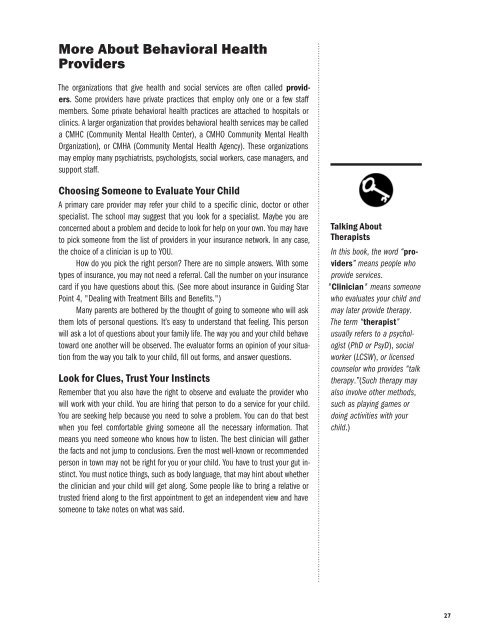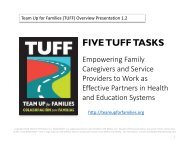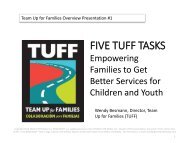Family Road Map Guide
You also want an ePaper? Increase the reach of your titles
YUMPU automatically turns print PDFs into web optimized ePapers that Google loves.
More About Behavioral Health<br />
Providers<br />
The organizations that give health and social services are often called providers.<br />
Some providers have private practices that employ only one or a few staff<br />
members. Some private behavioral health practices are attached to hospitals or<br />
clinics. A larger organization that provides behavioral health services may be called<br />
a CMHC (Community Mental Health Center), a CMHO Community Mental Health<br />
Organization), or CMHA (Community Mental Health Agency). These organizations<br />
may employ many psychiatrists, psychologists, social workers, case managers, and<br />
support staff.<br />
Choosing Someone to Evaluate Your Child<br />
A primary care provider may refer your child to a specific clinic, doctor or other<br />
specialist. The school may suggest that you look for a specialist. Maybe you are<br />
concerned about a problem and decide to look for help on your own. You may have<br />
to pick someone from the list of providers in your insurance network. In any case,<br />
the choice of a clinician is up to YOU.<br />
How do you pick the right person? There are no simple answers. With some<br />
types of insurance, you may not need a referral. Call the number on your insurance<br />
card if you have questions about this. (See more about insurance in Guiding Star<br />
Point 4, "Dealing with Treatment Bills and Benefits.")<br />
Many parents are bothered by the thought of going to someone who will ask<br />
them lots of personal questions. It’s easy to understand that feeling. This person<br />
will ask a lot of questions about your family life. The way you and your child behave<br />
toward one another will be observed. The evaluator forms an opinion of your situation<br />
from the way you talk to your child, fill out forms, and answer questions.<br />
Look for Clues, Trust Your Instincts<br />
Remember that you also have the right to observe and evaluate the provider who<br />
will work with your child. You are hiring that person to do a service for your child.<br />
You are seeking help because you need to solve a problem. You can do that best<br />
when you feel comfortable giving someone all the necessary information. That<br />
means you need someone who knows how to listen. The best clinician will gather<br />
the facts and not jump to conclusions. Even the most well-known or recommended<br />
person in town may not be right for you or your child. You have to trust your gut instinct.<br />
You must notice things, such as body language, that may hint about whether<br />
the clinician and your child will get along. Some people like to bring a relative or<br />
trusted friend along to the first appointment to get an independent view and have<br />
someone to take notes on what was said.<br />
Talking About<br />
Therapists<br />
In this book, the word “providers”<br />
means people who<br />
provide services.<br />
"Clinician" means someone<br />
who evaluates your child and<br />
may later provide therapy.<br />
The term “therapist”<br />
usually refers to a psychologist<br />
(PhD or PsyD), social<br />
worker (LCSW), or licensed<br />
counselor who provides “talk<br />
therapy.”(Such therapy may<br />
also involve other methods,<br />
such as playing games or<br />
doing activities with your<br />
child.)<br />
27














